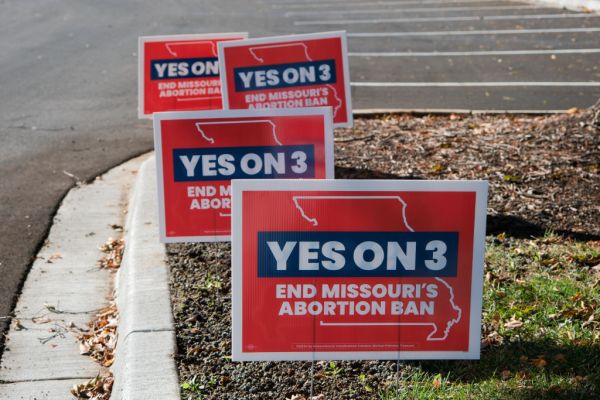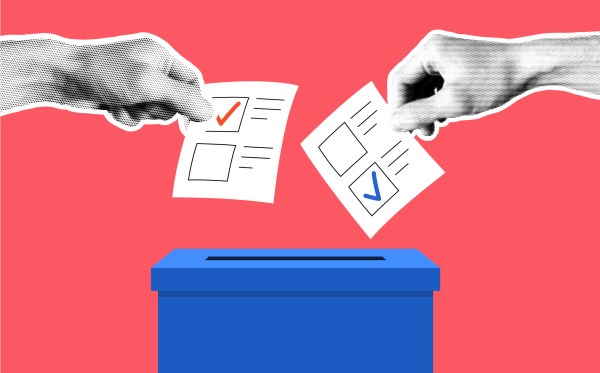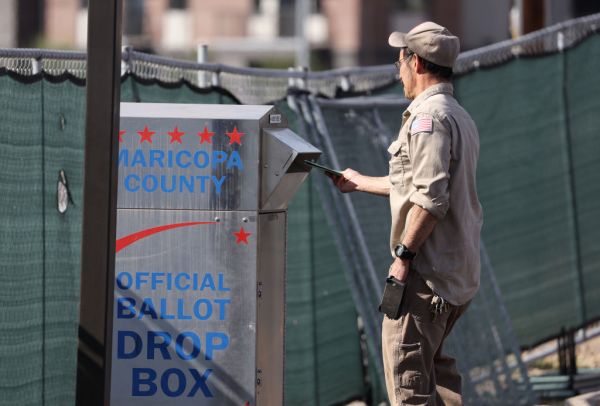It was close until it wasn’t. For most of the past year, the top three candidates vying for Missouri’s GOP Senate nomination—state attorney general Eric Schmitt, former Gov. Eric Greitens, and U.S. Rep. Vicky Hartzler—were neck-and-neck-and-neck, all in the 20-point range in the contest’s sporadic public polls, with each candidate showing signs at different times of a possible surge. But the dust had barely begun to settle Tuesday night before the outcome was clear: Schmitt had coasted to victory, with forecasters sticking a fork in the race after only a handful of precincts had reported their results. By the end of the night, with about 94 percent of the vote tallied, Schmitt was sitting on 45.7 percent, with Hartzler tagging up at 22 percent and Greitens limping into third with 19 percent.
Schmitt will face Democrat Trudy Busch Valentine this November in a race he is heavily favored to win. If he does, he’ll join a Senate delegation now helmed by his immediate predecessor as attorney general, Sen. Josh Hawley.
There are many reasons why a formerly tight race ended up with such a lopsided win for Schmitt, but the most important was how the attorney general successfully managed to position himself as the most viable alternative pick to former Gov. Greitens, who was attempting a Dark-MAGA comeback just four years after resigning from office in the wake of a sordid sex scandal. Many Republicans in the state and around the country feared Greitens’ baggage would risk losing the seat to a Democrat in November. When Greitens’ ex-wife, Sheena, accused him in court of abusing her and their children, it deepened their urgency to crush his campaign early. Outside groups poured money into the race, funding ads that reminded voters of Greitens’ earlier scandals and broadcasted Sheena Greitens’ claims. Greitens, who had entered the race as an early polling favorite, never recovered.
Schmitt had been banking on just such a fade. Although he took periodic shots against Greitens, for months he had campaigned largely as though he were in a two-candidate race against Hartzler, slagging her in ads as a “part of the D.C. swamp” who had spent her decade in office “getting richer off our tax dollars.” He got a huge boost in this effort from Donald Trump when the former president slapped Hartzler with a contemptuous anti-endorsement, saying that “I don’t think she has what it takes” to fight the left, the media, and squishy Republicans.
In the end, however, it was more than Trump’s say-so that gave Schmitt an edge over Hartzler. In another political environment, it would likely have been the six-term congresswoman who squared up as the more formidable contender, a retail-politics maven with deep Missouri roots who speaks comfortably in the social-conservative argot of rural evangelical Christianity and who boasts strong relationships with issue constituencies from the Family Research Council to the state farm bureau.
But many Republicans of the current moment don’t thrill to the prospect of a candidate who’s ready to get to Congress, roll up her sleeves, and dive into committee and constituent work. They’re looking instead for somebody who will head to Washington and get busy punching the Democrats in the mouth. And despite having been an aisle-crossing moderate during an earlier turn in the state Senate, Schmitt’s made the most of his perch as attorney general since 2019 to show he’s exactly the kind of candidate such voters have in mind. “I get up in the morning, I go to work, I sue Joe Biden, I go home” was a regular, effective, and accurate stump-speech line.
Even with both Greitens and Hartzler fading in the campaign’s closing days, one major wild card remained: the official imprimatur of Trump himself. All three major candidates—not to mention a few others—spent significant time and energy over the past year trying to wheedle the big man on board, and strategists from across the state party calculated that major support from Trump would likely prove decisive for whoever was lucky enough to receive it.
In the end, though, Trump involved himself only in farce, waiting until the literal eve of the primary to issue an instant-classic statement: “I trust the Great People of Missouri, on this one, to make up their own minds … and I am therefore proud to announce that ERIC has my Complete and Total Endorsement!”
By that point, even a ringing endorsement for Greitens might not have moved the needle much—except possibly by saving the former governor the embarrassment of coming in third.
“Once Trump agreed not to endorse someone early is when Schmitt won,” former state senator John Lamping, a one-time Greitens ally, told The Dispatch Tuesday. “He won the race five or six weeks ago.”









Please note that we at The Dispatch hold ourselves, our work, and our commenters to a higher standard than other places on the internet. We welcome comments that foster genuine debate or discussion—including comments critical of us or our work—but responses that include ad hominem attacks on fellow Dispatch members or are intended to stoke fear and anger may be moderated.
You are currently using a limited time guest pass and do not have access to commenting. Consider subscribing to join the conversation.
With your membership, you only have the ability to comment on The Morning Dispatch articles. Consider upgrading to join the conversation everywhere.